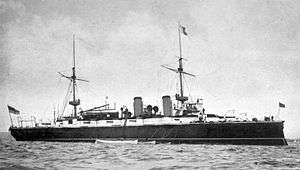HMS Orlando (1886)
 | |
| History | |
|---|---|
| Name: | HMS Orlando |
| Builder: | Palmers Shipbuilding and Iron Company, Jarrow |
| Laid down: | 23 April 1885 |
| Launched: | 3 August 1886 |
| Fate: | Sold for breaking up 11 July 1905 |
| General characteristics | |
| Class & type: | Orlando-class armoured cruiser |
| Displacement: | 5,600 tonnes (5,500 long tons) |
| Length: | 300 ft (91 m) p/p |
| Beam: | 56 ft (17 m) |
| Draught: | 22.5 ft (6.9 m) |
| Installed power: |
|
| Propulsion: |
|
| Speed: |
|
| Range: | 10,000 nautical miles (19,000 km) at 10 knots (19 km/h) |
| Complement: | 484 |
| Armament: |
|
| Armour: |
|
HMS Orlando was the lead ship of the Orlando class of first-class cruisers built in the yards of Palmers Shipbuilding and Iron Company, Jarrow and launched on 3 August 1886.
Service history
She was commanded by Charles Ramsay Arbuthnot on the Australia Station from 1892 to 1895. In 1899 she was assigned to the China Station,[1] Captain James Henry Thomas Burke in command. During the Boxer Rebellion in 1900, sailors from HMS Orlando formed part of the force led by Vice-Admiral Sir Edward Seymour attempting to relieve the British Legation in Beijing. A replica of a bell captured from the Taku Forts forms part of a memorial to HMS Orlando in Victoria Park, Portsmouth.
In late March 1902 she left Hong Kong for Singapore, arriving there on 6 April.[2] After three weeks, she left Penang in late April, homebound,[3] stopping at Colombo on 5 May,[4] Aden on 14 May,[5] Malta on 28 May,[6] and Gibraltar on 2 June, before arriving at Portsmouth four days later.[7] Captain Burke died at sea on 12 May 1902, during the journey, and was buried at Aden.[8] Commander Philip Howard Colomb was in charge fore the remainder of the journey.
HMS Orlando was sold for scrapping on 11 July 1905 to Ward of Morecambe for £10,000.[1]
Notes
- 1 2 Bastock, pp.98–99.
- ↑ "Naval & Military intelligence" The Times (London). Wednesday, 9 April 1902. (36737), p. 10.
- ↑ "Naval & Military intelligence" The Times (London). Wednesday, 30 April 1902. (36755), p. 9.
- ↑ "Naval & Military intelligence" The Times (London). Wednesday, 7 May 1902. (36761), p. 10.
- ↑ "Naval & Military intelligence" The Times (London). Friday, 16 May 1902. (36769), p. 11.
- ↑ "Naval & Military intelligence" The Times (London). Wednesday, 28 May 1902. (36779), p. 9.
- ↑ "Naval & Military intelligence" The Times (London). Saturday, 7 June 1902. (36788), p. 9.
- ↑ "Obituary - Captain James Burke" The Times (London). Saturday, 17 May 1902. (36770), p. 8.
References
- Bastock, John (1988), Ships on the Australia Station, Child & Associates Publishing Pty Ltd; Frenchs Forest, Australia. ISBN 0-86777-348-0
- Chesneau, Roger & Kolesnik, Eugene M., eds. (1979). Conway's All the World's Fighting Ships 1860–1905. Greenwich, UK: Conway Maritime Press. ISBN 0-8317-0302-4.
- Friedman, Norman (2012). British Cruisers of the Victorian Era. Barnsley, South Yorkshire, UK: Seaforth. ISBN 978-1-59114-068-9.
- Silverstone, Paul H. (1984). Directory of the World's Capital Ships. New York: Hippocrene Books. ISBN 0-88254-979-0.
External links
| Wikimedia Commons has media related to HMS Orlando (1886). |
- http://www.memorials.inportsmouth.co.uk/city-centre/orlando.htm
- http://www.battleships-cruisers.co.uk/hms_orlando.htm
| ||||||||||